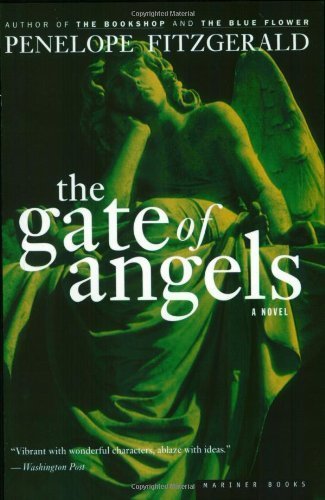Items related to The Gate of Angels

Synopsis
"synopsis" may belong to another edition of this title.
About the Author
Though Fitzgerald embarked on her literary career when she was in her 60's, her career was praised as "the best argument.. for a publishing debut made late in life" (New York Times Book Review). She told the New York Times Magazine, "In all that time, I could have written books and I didn’t. I think you can write at any time of your life."
Dinitia Smith, in her New York Times Obituary of May 3, 2000, quoted Penelope Fitzgerald from 1998 as saying, "I have remained true to my deepest convictions, I mean to the courage of those who are born to be defeated, the weaknesses of the strong, and the tragedy of misunderstandings and missed opportunities, which I have done my best to treat as comedy, for otherwise how can we manage to bear it?"
"About this title" may belong to another edition of this title.
£ 3.06 shipping from U.S.A. to United Kingdom
Destination, rates & speedsBuy New
View this item£ 32.85 shipping from U.S.A. to United Kingdom
Destination, rates & speedsSearch results for The Gate of Angels
The Gate of Angels
Seller: ThriftBooks-Atlanta, AUSTELL, GA, U.S.A.
Paperback. Condition: Good. No Jacket. Pages can have notes/highlighting. Spine may show signs of wear. ~ ThriftBooks: Read More, Spend Less 0.45. Seller Inventory # G0395848385I3N00
Quantity: 2 available
The Gate of Angels
Seller: ThriftBooks-Atlanta, AUSTELL, GA, U.S.A.
Paperback. Condition: Good. No Jacket. Former library book; Pages can have notes/highlighting. Spine may show signs of wear. ~ ThriftBooks: Read More, Spend Less 0.45. Seller Inventory # G0395848385I3N10
Quantity: 1 available
The Gate of Angels
Seller: ThriftBooks-Dallas, Dallas, TX, U.S.A.
Paperback. Condition: Good. No Jacket. Pages can have notes/highlighting. Spine may show signs of wear. ~ ThriftBooks: Read More, Spend Less 0.45. Seller Inventory # G0395848385I3N00
Quantity: 1 available
The Gate of Angels
Seller: ThriftBooks-Reno, Reno, NV, U.S.A.
Paperback. Condition: Good. No Jacket. Pages can have notes/highlighting. Spine may show signs of wear. ~ ThriftBooks: Read More, Spend Less 0.45. Seller Inventory # G0395848385I3N00
Quantity: 1 available
The Gate of Angels
Seller: ThriftBooks-Phoenix, Phoenix, AZ, U.S.A.
Paperback. Condition: Good. No Jacket. Former library book; Pages can have notes/highlighting. Spine may show signs of wear. ~ ThriftBooks: Read More, Spend Less 0.45. Seller Inventory # G0395848385I3N10
Quantity: 1 available
The Gate of Angels
Seller: ThriftBooks-Phoenix, Phoenix, AZ, U.S.A.
Paperback. Condition: Good. No Jacket. Pages can have notes/highlighting. Spine may show signs of wear. ~ ThriftBooks: Read More, Spend Less 0.45. Seller Inventory # G0395848385I3N00
Quantity: 1 available
The Gate of Angels
Seller: Better World Books, Mishawaka, IN, U.S.A.
Condition: Very Good. 1st Marine. Used book that is in excellent condition. May show signs of wear or have minor defects. Seller Inventory # 3252280-6
Quantity: 1 available
The Gate of Angels
Seller: Better World Books, Mishawaka, IN, U.S.A.
Condition: Good. 1st Marine. Used book that is in clean, average condition without any missing pages. Seller Inventory # 4111869-6
Quantity: 1 available
The Gate of Angels
Seller: Better World Books: West, Reno, NV, U.S.A.
Condition: Good. 1st Marine. Used book that is in clean, average condition without any missing pages. Seller Inventory # 4111869-6
Quantity: 1 available
The Gate of Angels
Seller: WeBuyBooks, Rossendale, LANCS, United Kingdom
Condition: Good. Most items will be dispatched the same or the next working day. A copy that has been read but remains in clean condition. All of the pages are intact and the cover is intact and the spine may show signs of wear. The book may have minor markings which are not specifically mentioned. A tan to the pages. Seller Inventory # wbs4976684827
Quantity: 1 available

